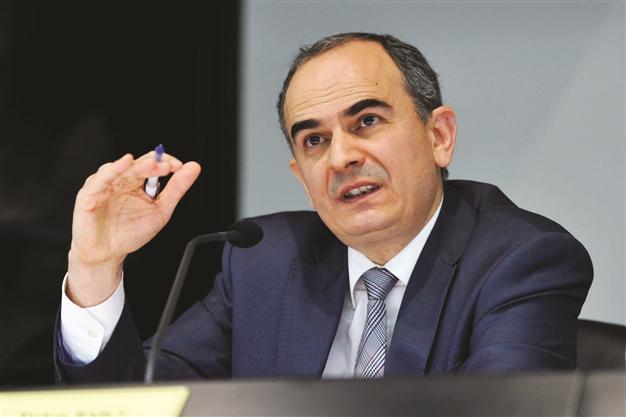Politics complicates Turkey’s interest rate policy
ISTANBUL - Reuters

Turkey’s Central Bank Governor Erdem Başçı is in seasaw between the political pressure for keeping interests low ahead of elections and supporting lira. CİHAN photo
A corruption scandal shaking Turkey’s government may delay for many more months a tightening of monetary policy that would stabilize inflation and stop the lira from plumbing record lows.
Across Turkish financial markets, there is a near-consensus that short-term interest rates need to be a lot higher - as much as 3 or 4 percentage points higher, some traders say - to be sure of relieving pressure on the sliding currency.
In recent weeks, this belief has strengthened as the global market environment has turned further against Turkey. The U.S. Federal Reserve’s decision last month to start cutting its monetary stimulus has hit a number of leading emerging economies, and means more pressure on the Turkish lira, which sank 17 percent against the dollar in 2013.
But the economic and political pressures created by the corruption scandal, which erupted in mid-December and forced the resignations of three ministers, make it harder for Turkey’s Central Bank to respond aggressively.
The damage which the graft investigations may inflict on business activity, particularly the construction sector, mean any interest rate increase could slow the economy yet further when it is already showing signs of losing steam.
A rate rise, which would lift costs for Turkish home buyers and building firms, would be politically controversial for the Justice and Development Party (AKP) ahead of upcoming elections, which has been already troubled with political scandal.
“The Central Bank is keener on supporting the economy rather than concentrating on inflation,” said Mehmet Besimoğlu, chief economist at Oyak Yatırım, a top Turkish securities firm.
“It seems to be comfortable with 7 to 8 percent inflation - only inflation risks heading to double digits would make it tighten policy aggressively.”
Using unorthodox monetary policy, the central bank has guided short-term market rates higher in recent months. The average cost of funding for banks is at 7.17 percent, up from 4.52 percent in late May, but still below annual inflation which was 7.40 percent in December.
OutflowsForeign portfolio investors shoveled cash into Turkey and other emerging markets while they were booming and global interest rates were soft. However, the Fed’s gradual withdrawal of help for the U.S. economy has raised the prospect of higher yields, encouraging investors to pull back from emerging markets including Turkey’s.
Central Bank data suggests fund outflows undermining the lira may continue for some time.
Non-resident holdings of domestic government debt securities sank to $52.7 billion on Dec. 27 from a $72 billion peak in May; equity holdings fell to $55 billion from $82 billion.
To counter the effect on the lira, the Central Bank has supplied foreign currency to the market; it had spent about $15 billion by late December and central bank governor Erdem Başçı said it would spend a further $6 billion by the end of January.
Market intervention in these volumes is proving enough to slow the lira’s drop but not to halt it - and with net foreign exchange reserves of under $40 billion, the Central Bank cannot safely spend much more.
“The big picture is Turkey doesn’t have enough reserves to spend on defending the currency,” said Manik Narain, emerging markets currency strategist at UBS in London.
That leaves interest rates as the one way to stabilize the lira. But with Turkish rates still below inflation, they will remain a recipe for currency weakness unless they rise much more sharply - something other emerging economies have already learnt.
“The lesson from places such as Brazil and Indonesia is that you have to tighten very aggressively to have an impact when the market is going against you,” Narain said.
